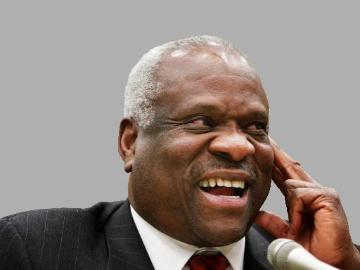
Joseph Russomanno is an associate professor at the Walter Cronkite School of Journalism and Mass Communication at Arizona State University. Views are his own.
A photo of Brett Kavanaugh is on a recent cover of Time magazine. The small image is tucked into the lower-right corner of the page. Hovering over him is a larger, faded, black and white image of Clarence Thomas. Both men have their right hands raised, swearing to tell the truth at their respective Senate confirmation hearings to the Supreme Court of the United States. The cover asks, “What’s changed?”
Indeed, the specter of Thomas and his 1991 hearing – when a professor accused him of sexual harassment – casts an eerily similar shadow over Kavanaugh’s efforts to claim a lifetime appointment (barring impeachment) to the high court. It’s an institution already fighting a credibility and legitimacy battle, in large part due to the politicization and partisanship of its members that begins, not so ironically, with their nomination and confirmation. As David Leonhardt wrote in The New York Times, the partisanship has turned every Supreme Court vacancy into “a pitched battle.” A kind of tribalism has taken over our politics, us versus them, where winning seems to be all that matters. As another institution is under siege, win the battle, lose the war.
Just one month after the death of John McCain some of the same senators with whom he served – and who extolled his virtues and character – now tarnish his “Country First” legacy. The irony is thick; the breach of moral responsibility is stunning.
It’s nothing short of a glaring lapse in basic ethical responsibility that makes the Kavanaugh situation far worse than it need be. As with so many issues today, the politics of party and individualism is prioritized. It is worth noting that in selecting Kavanaugh, the president (himself an admitted sexual assaulter, let’s not forget) strayed from his list of 20 Supreme Court candidates from which he pledged his nominees would come. Why? Could it be that none of those on the list can match Kavanuagh’s record of supporting executive authority? That could come in handy for a president under investigation. Self over country.
Another ethical lapse: Like the Republican majority of the Senate, the GOP-led Judiciary Committee rushed this process from the beginning, and for a variety of reasons. Might one have been to prevent “bothersome” accusations like sexual assault from surfacing before Kavanaugh was confirmed? Did they know of a questionable past? What led Senate Majority Leader Mitch McConnell to say from the beginning that Kavanaugh would be a challenge to get confirmed? Now Sen. McConnell has pledged that Kavanaugh will get a vote and will be confirmed. Ideology over country.
In the aftermath of the first – and then subsequent – sexual assault allegations against Kavanuagh, the idea was raised that the process should be delayed while the FBI investigated. No, many including the president said, that’s not what the FBI does, apparently forgetting what the “I” stands for. Besides, the process shouldn’t be delayed, they said. These were many of the same people, led by McConnell, who concluded that it was okay to ignore nominee Merrick Garland and leave a seat on the Court vacant for more than 400 days. Besides, the midterm elections are coming! Party over country.
Kavanaugh – a proven liar to the Judiciary Committee – categorically denies all accusations. Then why doesn’t he support an FBI investigation that would clear him? Self over country.
There are the echoes of 1991 when, as in 2018, a college professor reluctantly came forward with what she believed to be important information reflecting on the nominee’s character. Then, it was Anita Hill. Today, it’s Christine Blasey Ford. And Deborah Ramirez. And Julie Swetnick. Then, no one on the Senate’s all-white, all-male Senate Judiciary Committee had a clue about the victimization of women. They ask, Why make the accusations now, after all these years!? The same mindless questions reverberate today. According to TV host and assault victim Padma Lakshmi, the shame and fear after an attack are overwhelming, and often lead to silence. “[W]e all have a lot to lose,” she wrote, “if we put a time limit on telling the truth about sexual assault and if we hold on to the codes of silence that for generations have allowed men to hurt women with impunity.”
If ethics includes fairness, then the confirmation process, v. 2018 – which includes the suppression of thousands of documents related to Kavanaugh – can only be characterized as unethical. How ironic that Kavanaugh is striving for the title “Justice” when it is that very concept that he and his allies are denying to others. “What’s changed” since 1991? Not enough.